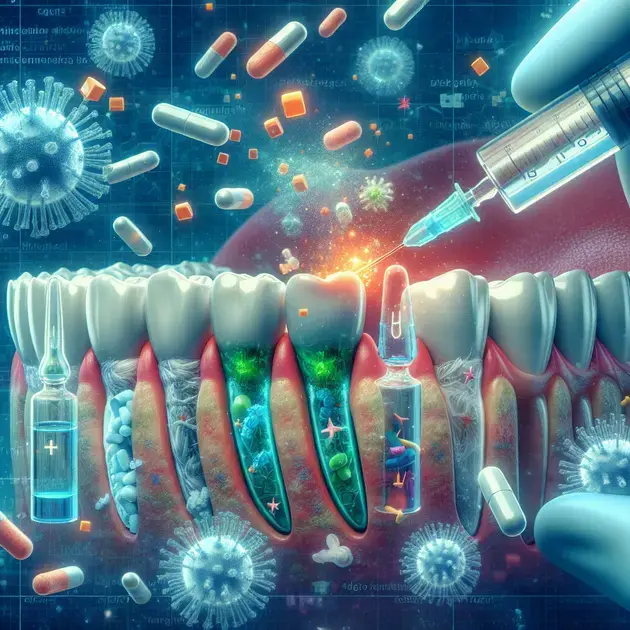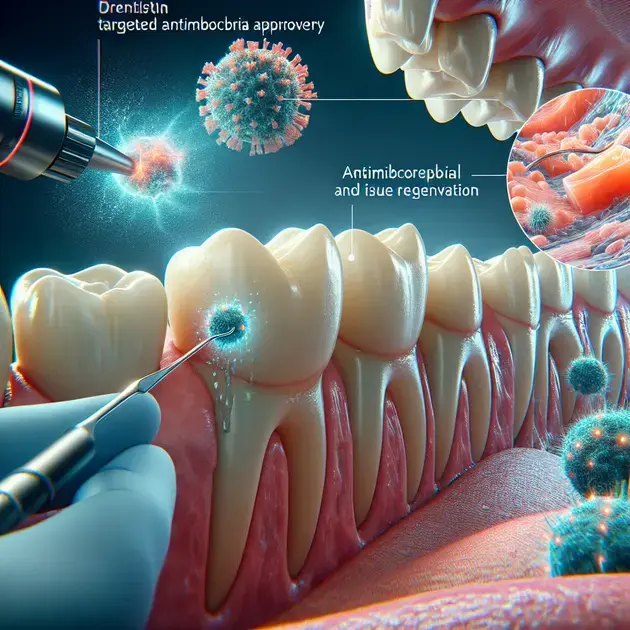Are you struggling with periodontitis and looking for a comprehensive guide on effective medication options? In this blog post, we will explore the latest advancements in treating periodontitis and provide you with detailed information on the most effective medications available.
Periodontitis is a common dental condition that affects millions of people worldwide. With the constant evolution of medical science, there are now more effective medications than ever before to help combat this chronic inflammatory disease. From antibiotics to antimicrobial mouthwashes, this guide will cover everything you need to know about finding the right medication for periodontitis.

Understanding Periodontitis Treatment Options
When it comes to understanding periodontitis treatment options, it’s essential to first consult with a dental professional to assess your specific condition. This typically involves a comprehensive dental exam, which may include x-rays, probing depths, and other diagnostic tools. Once the severity of your periodontitis is determined, your dentist will recommend a personalized treatment plan that may include various options.
One common treatment option for periodontitis is scaling and root planing, also known as deep cleaning. This procedure involves removing plaque and tartar from above and below the gumline, as well as smoothing the root surfaces to promote healing. Another option is antibiotic therapy, where antibiotics are either taken orally or applied directly to the affected areas to combat bacterial infections.
For more advanced cases of periodontitis, surgical interventions such as flap surgery or bone grafting may be necessary to restore gum and bone health. These procedures aim to reduce pocket depths, eliminate bacteria, and promote tissue regeneration. In some cases, laser therapy can also be used to target and remove diseased tissue while promoting healing.
It’s important to follow your dentist’s recommendations closely and maintain good oral hygiene habits at home to support the success of your treatment. Regular dental visits for cleanings and check-ups are crucial for monitoring your periodontal health and making any necessary adjustments to your treatment plan.
By staying informed about your periodontitis treatment options and actively participating in your care, you can improve the health of your gums and prevent further complications.
Exploring the Latest Medication Advancements
As research in periodontal health continues to evolve, new medication advancements are constantly being explored to enhance treatment options for patients with periodontitis. One of the latest advancements in medication for periodontal health is the use of locally delivered antimicrobials.
Locally delivered antimicrobials are antibiotics that are applied directly to the pockets around the teeth and gums, targeting the bacteria causing the infection. This targeted approach allows for a more effective delivery of medication to the affected areas while minimizing systemic side effects. Some commonly used locally delivered antimicrobials include Arestin and PerioChip.
Another promising medication advancement in the field of periodontitis treatment is the use of host modulation therapy. Host modulation therapy involves targeting the host response to periodontal infection, rather than focusing solely on bacteria elimination. Medications such as sub-antimicrobial dose doxycycline (SDD) have been shown to help reduce inflammation and support tissue repair in patients with periodontitis.
In addition to these advancements, research is ongoing into the potential use of probiotics, immune modulators, and other innovative medications to address the underlying causes of periodontitis and improve treatment outcomes. By staying informed about the latest medication advancements, patients and dental professionals can make more informed decisions about their treatment plans.
It’s important to discuss these medication advancements with your dental provider to determine if they are suitable for your specific needs and condition. Together, you can explore the latest options available and choose the most appropriate medication to support your periodontal health.
Choosing the Right Medication for Your Periodontal Health
When it comes to choosing the right medication for your periodontal health, it’s crucial to work closely with your dental provider to create a personalized treatment plan. The decision on which medication to use will depend on various factors, including the severity of your periodontal condition, your overall health, and any allergies or sensitivities you may have.
Before starting any medication for periodontal health, your dentist will conduct a thorough evaluation to assess your specific needs and determine the most suitable treatment options. This may involve discussing your medical history, conducting diagnostic tests, and considering any previous treatments you have tried.
It’s important to follow your dentist’s instructions carefully when taking medication for periodontal health, including adhering to the prescribed dosage and treatment duration. Be sure to inform your dental provider of any changes or concerns you experience while taking the medication, as they can provide guidance and make any necessary adjustments to your treatment plan.
In addition to medication, maintaining good oral hygiene practices such as brushing twice a day, flossing regularly, and using antimicrobial mouthwash can help support the effectiveness of your treatment. A healthy diet rich in vitamins and nutrients can also promote gum health and overall well-being.
By actively participating in your treatment plan and working closely with your dental provider, you can choose the right medication for your periodontal health and improve the condition of your gums. Regular follow-up visits and open communication with your dentist are key to ensuring the success of your treatment and maintaining good oral health in the long term.

Understanding Periodontitis Treatment Options
When it comes to managing periodontitis, there are various treatment options available to address this serious gum disease. The goal of treatment is to control the infection, prevent damage to the tissues and bones supporting the teeth, and ultimately, improve oral health. One of the common treatment options for periodontitis is professional cleaning, also known as scaling and root planing. This procedure involves removing plaque and tartar from the teeth and roots to promote healing and prevent further progression of the disease.
In more severe cases, surgical interventions may be necessary to treat periodontitis. Procedures such as flap surgery, bone grafts, or guided tissue regeneration can help restore damaged tissues and bones around the teeth. These surgical treatments aim to reduce pocket depths, eliminate bacterial infection, and support the long-term health of the gums and teeth.
Another important aspect of periodontitis treatment is patient education and self-care practices. Patients with periodontitis are often advised to improve their oral hygiene habits, including proper brushing and flossing techniques. In addition, using antimicrobial mouth rinses or prescribed antibiotics may be recommended to control bacterial growth and reduce inflammation in the gums.
It is crucial for individuals with periodontitis to work closely with their dental health professionals to develop a personalized treatment plan that suits their specific needs. Regular dental visits for monitoring and maintenance are essential to ensure the effectiveness of the treatment and prevent reoccurrence of the disease.
Overall, understanding the various treatment options available for periodontitis and following a comprehensive treatment plan can help individuals manage the condition effectively and maintain good oral health in the long run.
Enhancing Treatment Efficacy Through Innovative Medication Approaches
When traditional treatment methods for periodontitis may not be sufficient, innovative medication approaches can play a valuable role in enhancing treatment efficacy. One such approach is the use of locally delivered antimicrobials or antibiotics to target and eliminate the bacterial infection in the periodontal pockets. These medications are placed directly at the site of infection, allowing for a more targeted and effective treatment.
Additionally, the development of new antimicrobial agents and therapeutic agents for periodontitis has shown promising results in improving treatment outcomes. These innovative medications can help control bacterial growth, reduce inflammation, and promote tissue regeneration in the gums, supporting the overall healing process.
Furthermore, personalized medication strategies tailored to the individual’s specific oral health needs can optimize the effectiveness of periodontitis treatment. By considering factors such as the patient’s medical history, genetic predispositions, and response to medications, healthcare providers can prescribe personalized medication regimens that are more likely to yield positive results.
Advancements in pharmacogenomics and precision medicine have opened up new possibilities for identifying the most effective medications for each patient based on their unique genetic makeup. This personalized approach to medication selection can maximize treatment efficacy and minimize potential side effects, leading to better outcomes for individuals with periodontitis.
In conclusion, incorporating innovative medication approaches and personalized medication strategies into the treatment of periodontitis can greatly enhance treatment efficacy, improve patient outcomes, and ultimately, contribute to better overall oral health.
Conclusion
Understanding the various treatment options for periodontitis is crucial in effectively managing this serious gum disease. From professional cleanings to surgical interventions, the goal remains the same: controlling the infection, preventing tissue and bone damage, and enhancing overall oral health. Patient education and self-care practices play a significant role in treatment success, emphasizing the importance of maintaining proper oral hygiene habits and following personalized treatment plans.
Enhancing treatment efficacy through innovative medication approaches can offer valuable solutions, especially when traditional methods fall short. Locally delivered antimicrobials and antibiotics target bacterial infections precisely, while the development of new therapeutic agents shows promising results in reducing inflammation and promoting tissue regeneration. Personalized medication strategies tailored to individual oral health needs optimize treatment effectiveness and minimize potential side effects.
Advancements in pharmacogenomics and precision medicine present exciting opportunities for identifying the most suitable medications based on genetic makeup. This personalized approach not only maximizes treatment efficacy but also leads to better outcomes for individuals with periodontitis. By incorporating innovative medication approaches and personalized strategies into treatment plans, healthcare providers can significantly enhance treatment efficacy, improve patient outcomes, and contribute to better overall oral health.



